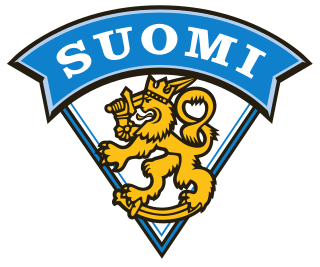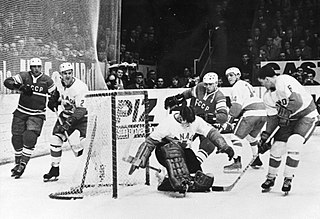
The Ice Hockey World Championships are an annual international men's ice hockey tournament organized by the International Ice Hockey Federation (IIHF). First officially held at the 1920 Summer Olympics, it is the sport's highest profile annual international tournament. The IIHF was created in 1908 while the European Championships, the precursor to the World Championships, were first held in 1910. The tournament held at the 1920 Summer Olympics is recognized as the first Ice Hockey World Championship. From 1920 to 1968, the Olympic hockey tournament was also considered the World Championship for that year.

The men's ice hockey tournament at the 1988 Winter Olympics in Calgary, Alberta, Canada, was the 16th Olympic Championship. The Soviet Union won its seventh gold medal. The silver medal was won by Finland, marking its first ever Olympic ice hockey medal. Sweden won the bronze medal. Games were held in the Olympic Saddledome, the Stampede Corral, and Father David Bauer Olympic Arena. This is so far the only Olympic tournament held on North American soil that was not won by either Canada or United States.

The Finnish men's national ice hockey team, nickname Leijonat / Lejonen, as it is called in Finland, is governed by the Finnish Ice Hockey Association. Finland is one of the most successful national ice hockey teams in the world and a member of the so-called "Big Six", the unofficial group of the six strongest men's ice hockey nations, along with Canada, the United States, the Czech Republic, Russia, and Sweden.
The men's ice hockey tournament at the 1960 Winter Olympics in Squaw Valley, United States, was the ninth Olympic Championship, also serving as the 27th World Championships and the 38th European Championships. The United States won its first Olympic gold medal and second World Championship. Canada, represented for the second time by the Kitchener-Waterloo Dutchmen, won the silver and Canada's ninth consecutive Olympic ice hockey medal. The Soviet Union won the bronze medal and its sixth European Championship. The tournament was held at the Blyth Arena, under the supervision of George Dudley on behalf of the International Ice Hockey Federation.
The men's ice hockey tournament at the 1964 Winter Olympics in Innsbruck, Austria, was the tenth Olympic Championship, also serving as the 31st World Championships and the 42nd European Championships. The games were held at the Olympiahalle Innsbruck.

The men's ice hockey tournament at the 1972 Winter Olympics in Sapporo, Japan, was the 12th Olympic Championship. Games were held at the Makomanai Ice Arena and at the Tsukisamu Indoor Skating Rink. The Soviet Union won its fourth gold medal. The United States won the silver, while Czechoslovakia won the bronze. Canada did not send a team to the event for the first time since ice hockey was first competed at the Olympics in 1920, instead competing with and defeating the Soviets in a competition later that year known as the Summit Series. Canada would not send a men's hockey team to the Olympics until 1980.

Ice hockey tournaments have been staged at the Olympic Games since 1920. The men's tournament was introduced at the 1920 Summer Olympics and was transferred permanently to the Winter Olympic Games program in 1924, in France. The women's tournament was first held at the 1998 Winter Olympics.
Václav Nedomanský is a Czech former ice hockey forward. Nedomanský is best known as the first Czech hockey player to defect to North America to play. He was inducted into the Hockey Hall of Fame in 2019. He is also a member of the International Ice Hockey Federation Hall of Fame (1997), Slovak Hockey Hall of Fame (2002), Czech Ice Hockey Hall of Fame (2008) and was named into the IIHF All-Time Czech Team (2020).

The 1965 Ice Hockey World Championships took place in Hakametsä, Tampere, Finland, 3–15 March. Eight teams took part, each playing each other once. The Soviets became world champions for the fifth time, winning all of their games. This also counted as their ninth European title, with the Czechs finishing second and the Swedes third. For the third straight year Canada finished fourth. The tournament employed new tie-breaking rules, which some believed were supposed to be in place for the Innsbruck Olympics. To decide medals priority would be given to the team who won the head-to-head game, unless they tied, or more than two teams were tied. In those two cases goal differential would be used, but only the goal differential between the top four teams.
The 1992 Men's Ice Hockey World Championships was the 56th such event sanctioned by the International Ice Hockey Federation (IIHF). Teams representing a record 32 countries participated in several levels of competition. The competition also served as qualifications for group placements in the 1993 competition.
The 1976 Ice Hockey World Championships were the 43rd Ice Hockey World Championships and the 54th European Championships in ice hockey. The tournament took place in Poland from 8 to 25 April, and the games were played in Katowice. Eight teams took part in the main tournament, with each team first playing each other once. The four best teams then took part in a medal play off, and the teams placed 5–8 took part in a relegation play-off. The teams took the results from the first round through to the second round with them.

The 2010 IIHF World Championship was the 74th IIHF World Championship, an annual international ice hockey tournament. It took place between 7 and 23 May 2010 in Germany. The games were played in the Lanxess Arena in Cologne, SAP Arena in Mannheim, and one game at Veltins-Arena in Gelsenkirchen. The Russian team was the defending champion, having won the previous two championships.

The 21st Ice Hockey World Championships and 32nd European ice hockey championships were held from 26 February to 7 March 1954 in Stockholm, Sweden. Every team played each other once with the top three finishers receiving medals at the end. The USSR won in its first attempt, led by Vsevolod Bobrov who was recognized as the best forward of the tournament in the first ever presentation of Directorate Awards.
The 1971 Ice Hockey World Championships was the 38th edition of the Ice Hockey World Championships, which also doubled as the 49th European ice hockey championships. The Pool A, Pool B and Pool C tournaments were hosted by the following nations:
The 1970 Ice Hockey World Championships was the 37th edition of the Ice Hockey World Championships. 21 nations participated in three different divisions or pools:
The 1969 Ice Hockey World Championships was the 36th edition of the Ice Hockey World Championships, which also doubled as the 47th European ice hockey championships. For the first time the Pool A, B and C tournaments were hosted by different nations:

The 1967 Ice Hockey World Championships was the 34th edition of the Ice Hockey World Championships. The tournament was held in Vienna, Austria from March 18 to March 29, 1967. The Soviet Union won the tournament for the fifth straight year, Sweden won the silver medal, and Canada claimed the bronze medal.
The 1962 Ice Hockey World Championships was the 29th edition of the Ice Hockey World Championships. The tournament was held in Colorado Springs and Denver, United States from March 8 to March 18, 1962. This was the first World Championship hosted in North America that was not part of ice hockey at the Olympic Games.

The 2018 IIHF World Championship was an international ice hockey tournament hosted by the Danish cities of Copenhagen and Herning, held from 4–20 May 2018. The IIHF announced the winning bid on 23 May 2014 in Minsk, Belarus. South Korea made its debut at the World Championship, having played in the lower divisions previously.










